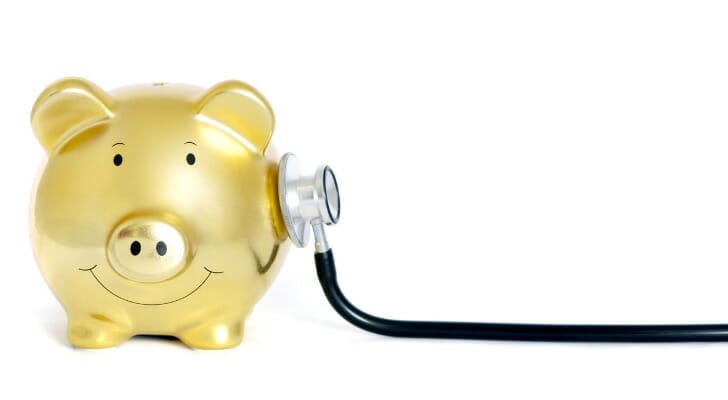As Americans pay more for healthcare, many seek new ways to save in case of emergencies. Some may not even know they have access to tax-free money to pay for medical costs through health savings accounts (HSAs) and health reimbursement accounts (HRAs), which can be two ways to use tax-free money to pay for medical costs. So which one should you use? The answer depends on your individual needs, which is why it’s important to weigh the pros and cons of an HSA vs. an HRA. You may also want to work with a financial advisor who can provide you with a financial plan to make sure you’re prepared for medical costs.
What Is an HSA?
An HSA helps individuals save for future medical expenses. Plus, an HSA offers three distinct tax benefits. First, you fund them with “pre-tax” dollars, often directly taken from your paycheck. This means the account gets funded before your paycheck gets taxed. As a result, you lower your taxable income. In other words, you end up getting taxed as if you made less money.
Second, your money grows tax-free. You can open an HSA through participating employers or a financial institution such as a bank or mutual fund company. The IRS won’t tax any interest, dividends from stocks or capital gains your money generates. This stands as a very rare benefit. Brokerage accounts, for example, get taxed.
Finally, the IRS won’t tax withdrawals you make for qualified medical expenses. These include procedures and services that your own health insurance plan may not even cover. But here’s the catch: in order to open an HSA, you must pair it with a high deductible health plan (HDHP). Generally speaking, these types of health insurance plans most benefit young and healthy people who don’t expect many medical costs throughout the year.
Here are the most important pros and cons of using an HSA:
Pros of a Health Savings Account
- Triple tax benefits
- Tax-deductible contributions
- Money rolls over into next year
- Covers wide range of medical expenses, including ones your insurance plan may not cover
- Most plans offer debit cards
Cons of a Health Savings Account
- Need to pair it with an high-deductible health plan
- Not the best choice for everyone
- You may need long-term care, for which a low-deductible health plan may be a better choice
Who Should Get an HSA?
You may be asking yourself, who do HSAs make sense for? Generally speaking, you should open an HSA account if you’re comfortable with having an HDHP. These plans have high deductibles. So it may be harder to pay it off before your insurance kicks in. However, these plans typically carry lower monthly premiums. This serves as a plus for both you and your employer.
With that said, HSAs tend to suit people better who don’t expect many health expenses. In this case, HSAs can be extremely beneficial. You will save money for healthcare costs over time and when you get sick, you can make tax-free withdrawals for qualified medical expenses. And when you’re thinking about what can you deduct at tax time, you’d be ahead of the game. You can deduct your contributions from your federal taxable income. On the upside, you have until April 15 of the following year to contribute toward the maximum and claim it as a deduction.
The HSA maximum contribution for 2018 stands at $3,450 for individual coverage and $6,900 for family coverage. That increases in 2019 to $3,500 for single coverage and $7,00 for family coverage. And if you’re age 55 or older, you can make additional contributions of $1,000 per year. In fact, many experts suggest using HSAs as part of your holistic retirement planning strategy.
However, HSAs may not make sense if you expect frequent medical attention due to something like chronic illness. In this case, a low-deductible health plan may be a better choice. Your premiums would be higher. But you’d meet your deductible and therefore insurance benefits sooner.
Of course, you can’t open an HSA if you have a low-deductible health plan. Nonetheless, you can always open a flexible spending account (FSA) if your employer offers one. These function similarly to HSAs. You contribute money on a pre-tax basis. And you can make tax-free withdrawals to cover qualified medical expenses. However, your money won’t generate interest. And you can’t roll over your account balance into the following year. You must use your funds within the year or they disappear.
What Is an HRA?
A health reimbursement arrangement, or HRA, works a bit differently than an HSA. First of all, employers solely fund this type of account. So if yours offers one, you’re in luck. Second, you don’t necessarily withdraw funds from HRAs to cover medical costs. Instead, you must incur these expenses first. Your employer will then reimburse you for qualified medical expenses.
However, the IRS considers a wide range of services for which you can get reimbursed. In addition, your employer decides how much to contribute toward employees’ HRAs each year. You can’t contribute your own money into the account.
HRA Pros of a Health Reimbursement Account
- Entirely employer-funded
- Covers a wide range of medical expenses
- Don’t need a particular health insurance plan to open an HRA
HRA Cons of a Health Reimbursement Account
- Can’t contribute your own money
- Employer sets annual contribution limits and most of the rules behind your plan
- Plan doesn’t come with you if you leave your company or get fired
Who Should Get an HRA?

You may be asking yourself, who do HSAs make sense for? Generally speaking, you should open an HSA account if you’re comfortable with having an HDHP. These plans have high deductibles. So it may be harder to pay it off before your insurance kicks in. However, these plans typically carry lower monthly premiums. This serves as a plus for both you and your employer.
With that said, HSAs tend to suit people better who don’t expect many health expenses. In this case, HSAs can be extremely beneficial. You will save money for healthcare costs over time and when you get sick, you can make tax-free withdrawals for qualified medical expenses. And when you’re thinking about what can you deduct at tax time, you’d be ahead of the game. You can deduct your contributions from your federal taxable income. On the upside, you have until April 15 of the following year to contribute toward the maximum and claim it as a deduction.
The HSA maximum contribution for 2018 stands at $3,450 for individual coverage and $6,900 for family coverage. That increases in 2019 to $3,500 for single coverage and $7,00 for family coverage. And if you’re age 55 or older, you can make additional contributions of $1,000 per year. In fact, many experts suggest using HSAs as part of your holistic retirement planning strategy.
However, HSAs may not make sense if you expect frequent medical attention due to something like chronic illness. In this case, a low-deductible health plan may be a better choice. Your premiums would be higher. But you’d meet your deductible and therefore insurance benefits sooner.
Of course, you can’t open an HSA if you have a low-deductible health plan. Nonetheless, you can always open a flexible spending account (FSA) if your employer offers one. These function similarly to HSAs. You contribute money on a pre-tax basis. And you can make tax-free withdrawals to cover qualified medical expenses. However, your money won’t generate interest. And you can’t roll over your account balance into the following year. You must use your funds within the year or they disappear.
What Is an HRA?
A health reimbursement arrangement, or HRA, works a bit differently than an HSA. First of all, employers solely fund this type of account. So if yours offers one, you’re in luck. Second, you don’t necessarily withdraw funds from HRAs to cover medical costs. Instead, you must incur these expenses first. Your employer will then reimburse you for qualified medical expenses.
However, the IRS considers a wide range of services for which you can get reimbursed. In addition, your employer decides how much to contribute toward employees’ HRAs each year. You can’t contribute your own money into the account.
HRA Pros of a Health Reimbursement Account
- Entirely employer-funded
- Covers a wide range of medical expenses
- Don’t need a particular health insurance plan to open an HRA
HRA Cons of a Health Reimbursement Account
- Can’t contribute your own money
- Employer sets annual contribution limits and most of the rules behind your plan
- Plan doesn’t come with you if you leave your company or get fired
Who Should Get an HRA?
If your employer offers an HRA, you should definitely consider opening an account. These are entirely employer-funded, and you’d have a medical emergency fund at your disposal.
With an HRA, you may not get any tax benefits yourself. In fact, your employer will likely end up getting the tax break. But this arrangement encourages more employers to offer these accounts to their employees. And it’s one of those rare examples of free money in the workplace. The only other one that comes close is whether your employer offers a company match on its 401(k) plan. And even though you don’t need to pair an HRA with an HDHP, you still have to link it with a group health plan as determined by your employer.
Can You Have an HSA and an HRA?
You can have an HSA and an HRA at the same time but you must follow a few rules. First, make sure you have an eligible HDHP. The IRS determines the criteria for HDHPs. For 2025, an HDHP must have a minimum deductible of of $1,650 for single coverage and $3,300 for family coverage. The out-of-pocket maximum also can’t exceed $8,300 for single coverage and $16,600 for family coverage.
However, it must meet other stipulations as well. For example, you can’t open an HSA if your HDHP covers non-preventive-care services before you meet your deductible. The best way to figure out if you’re covered by an eligible health insurance plan is to speak with someone in your employer’s benefits department. If you’re eligible and your employer doesn’t offer one, you can always open one through your bank or credit union.
In addition, you can’t have any other health insurance plan that’s not high-deductible to qualify. But if you meet these conditions, you can open an HSA as well as an HRA. However, your options get limited to the following:
- Limited Purpose HRA: This type of plan covers certain medical services, including dental and vision procedures. However, your expenses won’t reduce your deductible.
- Post-Deductible HRA: Covers qualified medical expenses after you pay off your deductible.
- Retirement HRA: These cover qualified medical expenses after retirement. However, you can use your HSA up until that point in time before you lose eligibility for an HSA. At this point, you can use your HRA.
HSA vs. HRA vs. FSA: A Side-by-Side Comparison
If you’re trying to decide between an HSA, HRA, or FSA, the differences can get confusing. Here’s a quick comparison to help you determine which plan best aligns with your needs and healthcare situation.
| Feature | HSA (Health Savings Account) | HRA (Health Reimbursement Arrangement) | FSA (Flexible Spending Account) |
| Who Can Contribute | Employee and employer | Employer only | Employee and sometimes employer |
| Contribution Limits | IRS sets annual limits ($4,300 single / $8,550 family for 2025) | Employer sets limit | IRS sets annual limit ($3,300 for 2025) |
| Account Ownership | Employee | Employer | Employer |
| Rollover Rules | Unused funds roll over indefinitely | Varies by employer | Limited rollover or grace period (employer sets) |
| Portability | Yes, stays with employee after job change | No, generally forfeited when leaving employer | No, generally forfeited when leaving employer |
| Tax Advantages | Triple tax benefit: pre-tax contributions, tax-free growth, tax-free withdrawals for medical expenses | Employer gets tax deduction | Contributions are pre-tax, withdrawals for medical expenses are tax-free |
| Eligible Expenses | Qualified medical expenses as defined by IRS | Qualified expenses per employer plan rules | Qualified medical expenses as defined by IRS |
How to Choose the Right Account for You
Choosing between an HSA, HRA, or FSA depends on your financial situation, healthcare needs, and employer benefits. Asking yourself the following questions can help you decide:
1. What Kind of Health Plan Do You Have?
If you have a high-deductible health plan (HDHP), then you may qualify for an HSA.
If you have a traditional health plan or no insurance, you may only qualify for an FSA or HRA, depending on what your employer offers.
2. Do You Want to Invest Your Medical Savings?
If you want the option to invest your unused medical savings in mutual funds or other vehicles, an HSA could be your best choice.
If you don’t plan to invest your funds and just want to use the account for medical spending, an FSA or HRA may be sufficient.
3. Are You Looking for Portability?
If you want the account to stay with you even if you change jobs or retire, you may want to go with an HSA.
If you’re okay with losing access to the funds if you leave your employer, then an FSA or HRA may work for you.
4. How Predictable Are Your Medical Expenses?
If you have low or occasional healthcare costs (for example, you’re young and healthy), an HSA paired with an HDHP can help you save and invest over time.
If you have moderate, recurring expenses, like regular prescriptions or doctor visits for dependents, an FSA can help you plan your annual contributions.
If you have high or unpredictable healthcare costs (such as for a chronic illness), an employer-sponsored HRA may offer more immediate financial relief.
5. Do You Want Employer Contributions?
If employer contributions are important to you, both HSAs and HRAs can offer this benefit, though HRAs are entirely funded by your employer.
If employer funding isn’t a priority, an FSA still gives you tax advantages on the money you contribute yourself.
Bottom Line

HSAs and HRAs offer several benefits including tax breaks. You also get the peace of mind that comes with having access to an emergency medical fund in case you need it and your health insurance won’t cover certain services. However, these are not the best for everyone. HSAs typically benefit healthy people who don’t speculate needing much medical attention throughout the year. If you suffer from a chronic condition, a flexible spending account with a low-deductible health insurance plan may be best for you.
Tips for Saving
- Investing in HSAs can be as beneficial as it is complicated. You have to follow certain rules to enjoy all the tax breaks and avoid penalties. You can work with a professional financial advisor who can help with this and finding a financial advisor doesn’t have to be hard. SmartAsset free tool matches you with up to three financial advisors who serve your area, and you can interview your advisor matches at no cost to decide which one is right for you. If you’re ready to find an advisor who can help you achieve your financial goals, get started now.
- You may have a qualified high-deductible health plan but what if your employer doesn’t offer HSAs as part of its benefits package? Don’t sweat it. You can open an HSA these days through most major banks. To help narrow your choices, we published a report on the best banks in the United States.
Photo credit: ©iStock.com/malamus-UK, ©iStock.com/cnythzl, ©iStock.com/Rawpixel
